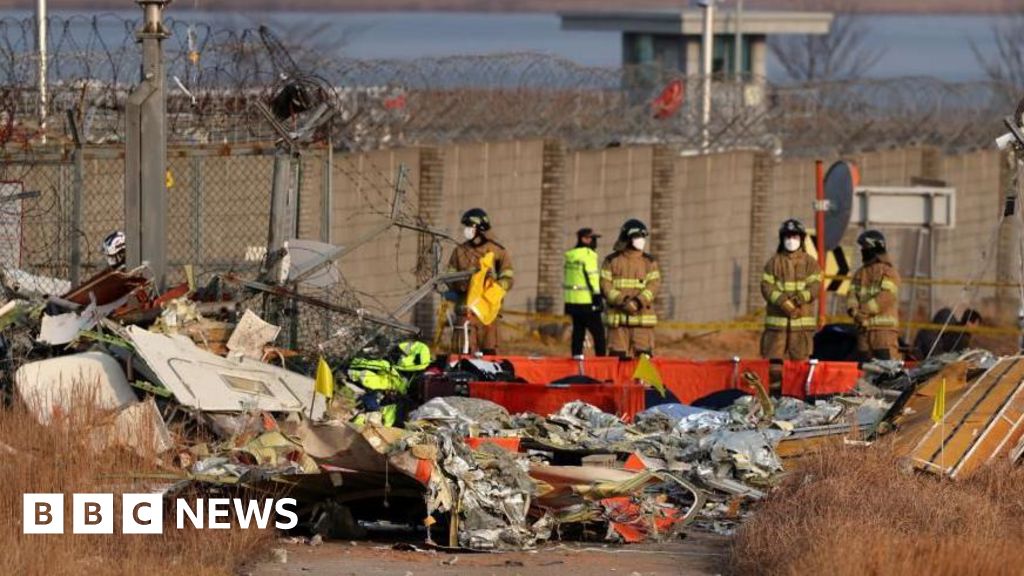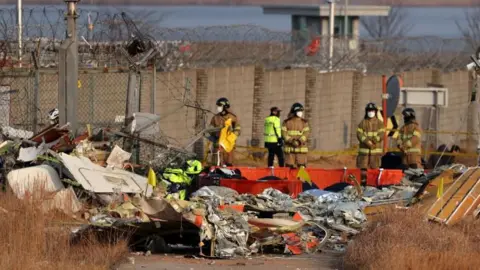 EPA
EPAMore than 170 people have died after one plane crashed when it landed in South Korea Sunday morning.
Shocking video footage shows the Jeju Air plane skidding off the runway before colliding with a barrier and bursting into flames at Muan International Airport.
The plane, which was returning from Bangkok in Thailand, was carrying 181 people – of whom 179 have died, while two crew members were rescued from the wreckage.
The authorities are investigating the cause of the accident, which the fire service has indicated may have occurred due to a bird attack and bad weather. However, experts have warned that the accident could be caused by a number of factors.
Could a bird strike have contributed to the crash?
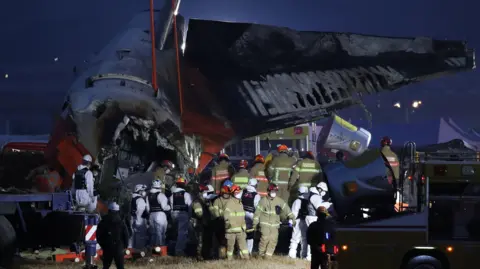 Getty Images
Getty ImagesThe aircraft, 7C2216, was a Boeing 737-800 operated by Jeju Air, Korea’s most popular low-cost airline.
The plane arrived in Muan at about 09:00 local time (00:00 GMT).
A South Korean transport official said the plane had attempted to land but was forced to hold off after air traffic control issued a bird strike warning – a warning about the risk of a collision with birds.
About two minutes later, the pilot called a mayday and air traffic command cleared the plane to land from the opposite direction, the official said.
A video appears to show the plane touching down without using its wheels or other landing gear. It skidded down the runway and crashed into a wall before bursting into flames.
A witness told South Korean news agency Yonhap that they heard a “loud bang” followed by a “series of explosions”.
Videos from the scene show the plane burning with smoke billowing into the sky. The fire department has since extinguished the fire.
Lee Jeong-hyun, the chief of the Muan Fire Department, told a televised briefing that the tail section of the plane was identifiable, but “one cannot recognize the shape of the rest of the plane”.
He said the bird strike and bad weather may have caused the crash – but that the exact cause is still being investigated. The plane and voice recorders from the plane have been recovered, although the Yonhap news agency reported that the former were damaged.
An investigator told the news agency that the black boxes could take up to a month to decode.
A passenger on the plane texted a relative saying a bird “stuck in the wing” and the plane could not land, local media reported.
However, officials have not confirmed whether the plane actually collided with any birds.
The head of Jeju Air’s management said the crash was not due to “maintenance issues,” Yonhap reported.
South Korea’s transport department said the flight’s chief pilot had held the role since 2019 and had more than 6,800 hours of flying experience.
Geoffrey Thomas, an aviation expert and editor of Airline News, told the BBC that South Korea and its airlines were considered “industry best practice” and that both the plane and the airline have an “excellent safety record”.
He added: “Many things about this tragedy do not make sense.”
What is a bird strike?
A bird strike is a collision between an aircraft in flight and a bird. They are very common – in the UK more than 1,400 bird strikes were reported in 2022, of which only around 100 affected aircraft, according to data from the Norwegian Civil Aviation Authority.
The best-known bird attack occurred in 2009, when a The Airbus plane made an emergency landing on the Hudson River in New York after encountering a flock of geese. All 155 passengers and crew survived.
Professor Doug Drury, who teaches aviation at CQUniversity Australia, wrote in an article for The conversation this summer that Boeing planes have turbofan engines that can be seriously damaged by a bird strike.
He said pilots are trained to be especially alert early in the morning or at sunset, when the birds are most active.
But some aviation experts are skeptical that a bird strike could have caused the crash at Muan Airport.
“Typically they [bird strike] not cause the loss of an aircraft by itself,” Thomas told Reuters.
Australian security expert Geoffrey Dell also told the news agency: “I’ve never seen a bird strike prevent the landing gear from being extended.”
Who are the victims of the plane crash and the survivors?
The plane had 175 passengers and six crew members. Two of the passengers were Thai, and the rest are believed to have been South Korean, authorities said. Many are believed to have returned from a Christmas holiday in Thailand.
The official death toll is 179 – making it the deadliest plane crash in South Korea’s history.
All passengers and four crew members died.
Officials have collected saliva samples from family members gathered at Muan Airport to help identify the bodies of the victims. Other victims have been identified by their fingerprints.
The authorities have so far identified 141 bodies.
Five of the people who died were children under the age of 10. The youngest passenger was a three-year-old boy and the oldest was 78, authorities said, citing the passenger manifest.
“I can’t believe the whole family just disappeared,” Maeng Gi-Su, 78, whose nephew and great-nephews were on the plane, told the BBC. “My heart hurts so much.”
South Korea’s National Fire Authority said two members of the flight crew – a man and a woman – survived the crash. They were found in the tail side of the plane after the crash and taken to hospital, it said.
The man has woken up and is “fully able to communicate,” according to Yonhap, citing the director of the Seoul hospital where he is being treated.
More than 1,500 emergency personnel have been deployed as part of the recovery effort, including 490 firefighters and 455 police officers. They have searched the area around the runway for parts of the plane and those on board.
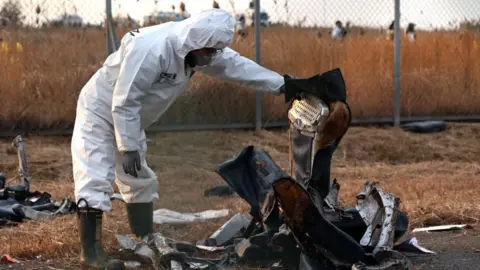 EPA
EPAWhat are officials doing now?
Acting President Choi Sang-mok has ordered an emergency safety inspection of all the country’s airlines.
Muan has also been declared a special disaster zone, which makes central government funds available to the local government and victims.
All flights to and from Muan International Airport have been cancelled.
A national seven-day mourning period has been declared and New Year’s celebrations in the country are likely to be canceled or reduced.
Airliner Boeing has said it is in contact with Jeju Air and is “ready to support them”.
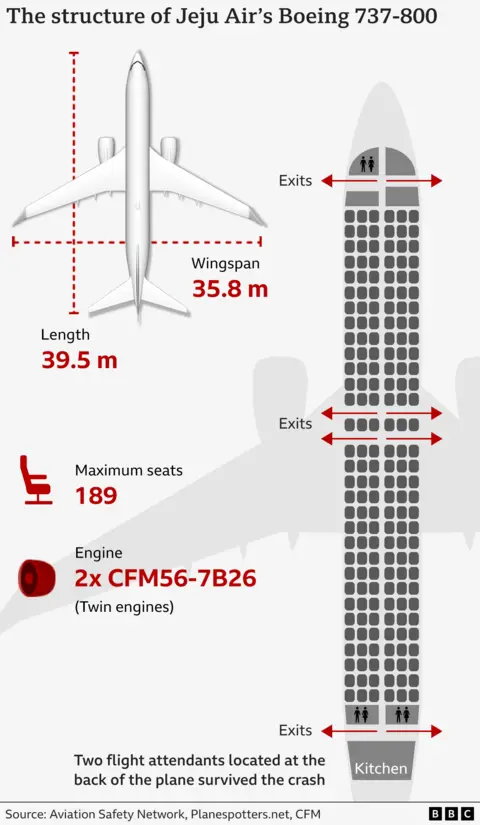
Jeju Air has apologized to families, and its CEO said at a news conference that the airline had no history of accidents. Sunday’s crash is believed to be the only fatality since the airline was launched in 2005.
